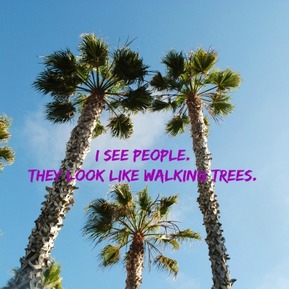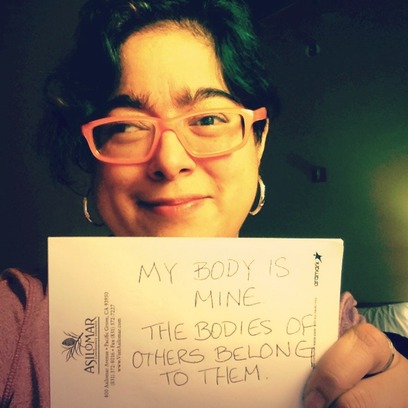They Look Like Walking Trees. <shrug>
 I see people. They look like walking trees. The image is three palm trees against a blue sky and a fleecy cloud.
I see people. They look like walking trees. The image is three palm trees against a blue sky and a fleecy cloud. While being disabled has its challenges, one of the hidden gifts it offers is the opportunity to see how often people act in compassion. Sometimes people show their compassion in tiny, lovely ways. Not too long ago, I stopped at a coffee shop to get a latte, breve, three raw sugars. It had a lid on it, but as I held the coffee in one hand and drove my scooter away from the counter, the coffee splashed on me. There was a tiny, hot puddle on the arc between my thumb and forefinger. Another coffee shop customer crossed my path: brown corduroy blazer, blue tie, round, gold-rimmed glasses, and he stopped. I thought he was going to offer to carry my drink. Instead, he took a napkin and wiped my hand.
He reminded me of the difference between sympathy and empathy. He reminded me that acting from empathy can lead to lived compassion. Of course I can feel sorrow over someone else’s suffering. This is something like a quick review of it, like trying to read a billboard while your bus rushes by on the highway. Blurry.
There’s a story about something like this in the Christian Scripture. Jesus arrived at Bethsaida in the middle of a tough conversation with Their followers. “Do you still not get it?” Jesus asked. Then some people came.
“Jesus, please,” they said, “our friend can’t see. Can you heal his eyes?”
Jesus went with the man outside of town. Then he spit in the man’s eyes. This is fair because a lot of times when we are called to act in compassion it is not neat and sanitized. It’s just a human situation, with humans in it. I’ve spilled coffee. I’ve made a mistake. I encounter someone struggling with poverty or illness or addiction. God doesn’t ask me to be perfect, but God does ask me to hold still long enough to be of use, to have the spit applied, to be the spit. To have my hand wiped off.
“Do you see anything?” Jesus asked.
The man said, “I see men. They look like walking trees.”
I think this part of the story is funny, mostly because it brings on what my friend Thea calls, “the laughter of recognition”. I am that person sometimes. I am covered in the miracle of humanity, surrounded by miracles, each of whom has a universe of life and experience inside them. And sometimes all I see is trees. I sum up their story in one line or less, the annoying one, the aloof one, the homeless one.
To actually feel the experience of another, to respond and act from that place is connecting more closely. It’s thinking of how life feels for another person. This allows them to be someone with whom we relate for who they really are.
One way to read healing stories in Scripture goes beyond disability being bad and healing being good. Rather, we ask of the story, “Where does transformation happen?”
So Jesus laid hands on his eyes again. The man looked hard and realized that he had recovered perfect sight, saw everything in bright, twenty-twenty focus. Jesus sent him straight home, telling him, “Don’t enter the village.”
The man realized his eyes were fine. Maybe the blurry moment was practice in really focusing. Maybe the transformation happened not in the person’s eyes, but in his heart, as he was able to consider, as are we, how it is that we really define and consider the people around us. Compassion calls us to consider them as human, which is to say, as particular miracles. We can respond and act in that way. #1000Speak
For more information:
http://yvonnespence.com/all/he-is-worthy-of-compassion/
He reminded me of the difference between sympathy and empathy. He reminded me that acting from empathy can lead to lived compassion. Of course I can feel sorrow over someone else’s suffering. This is something like a quick review of it, like trying to read a billboard while your bus rushes by on the highway. Blurry.
There’s a story about something like this in the Christian Scripture. Jesus arrived at Bethsaida in the middle of a tough conversation with Their followers. “Do you still not get it?” Jesus asked. Then some people came.
“Jesus, please,” they said, “our friend can’t see. Can you heal his eyes?”
Jesus went with the man outside of town. Then he spit in the man’s eyes. This is fair because a lot of times when we are called to act in compassion it is not neat and sanitized. It’s just a human situation, with humans in it. I’ve spilled coffee. I’ve made a mistake. I encounter someone struggling with poverty or illness or addiction. God doesn’t ask me to be perfect, but God does ask me to hold still long enough to be of use, to have the spit applied, to be the spit. To have my hand wiped off.
“Do you see anything?” Jesus asked.
The man said, “I see men. They look like walking trees.”
I think this part of the story is funny, mostly because it brings on what my friend Thea calls, “the laughter of recognition”. I am that person sometimes. I am covered in the miracle of humanity, surrounded by miracles, each of whom has a universe of life and experience inside them. And sometimes all I see is trees. I sum up their story in one line or less, the annoying one, the aloof one, the homeless one.
To actually feel the experience of another, to respond and act from that place is connecting more closely. It’s thinking of how life feels for another person. This allows them to be someone with whom we relate for who they really are.
One way to read healing stories in Scripture goes beyond disability being bad and healing being good. Rather, we ask of the story, “Where does transformation happen?”
So Jesus laid hands on his eyes again. The man looked hard and realized that he had recovered perfect sight, saw everything in bright, twenty-twenty focus. Jesus sent him straight home, telling him, “Don’t enter the village.”
The man realized his eyes were fine. Maybe the blurry moment was practice in really focusing. Maybe the transformation happened not in the person’s eyes, but in his heart, as he was able to consider, as are we, how it is that we really define and consider the people around us. Compassion calls us to consider them as human, which is to say, as particular miracles. We can respond and act in that way. #1000Speak
For more information:
http://yvonnespence.com/all/he-is-worthy-of-compassion/


 RSS Feed
RSS Feed